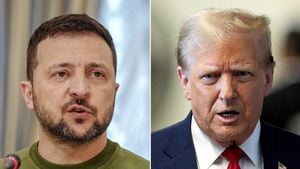International responses to the Ukraine conflict continue to evolve as governments grapple with the impact of the war on their domestic and foreign policies. Recent discussions have highlighted contrasting views among leaders on the adequacy of support for Ukraine's defense against Russian aggression.
On one side, Italian Minister of the Environment and Energy Security, Gilbert Pichetto Fratin, recently expressed the government's intent to provide economic assistance to vulnerable populations affected by the conflict. During an interview with La Stampa, he stated, "We will intervene to give a hand to the vulnerable". The focus of the Italian government appears to shift not only toward immediate support for its citizens but also toward the broader economic relationship with Russia, indicating potential discussions for reopening trade once peace is established.
Pichetto elaborated on Italy's plans to regulate energy prices, which are expected to be presented to the Council of Ministers soon. His statements imply awareness of shifting market dynamics, mentioning, "Companies made offers, even negative ones, to grab millions of customers, and now those customers are suffering." This reflects concerns over energy security and affordability as the war disrupts traditional supply lines.
Meanwhile, he also indicated the complicated dance of diplomacy—discussing the possibility of reviving trade with Russia contingent on the establishment of peace. "If there is a peace agreement, then everything [economic agreements] come[s] up for discussion," he noted, emphasizing the balance between pressing immediate energy needs and planning for the future.
Across the channel, U.S. President Donald Trump aimed barbs at French President Emmanuel Macron and U.K. Prime Minister Keir Starmer, accusing them of failing to do enough to support Ukraine. Speaking on Fox News, he claimed, "Macron and Starmer haven't done anything to end the war in Ukraine". This criticism reflects frustration from the U.S. over perceived delays and insufficient military and financial support from its European allies.
Trump's comments come just days before Macron and Starmer are set to visit the White House, adding pressure on these leaders to demonstrate their commitment to ending the war. Critics argue this public outcry reveals tension between American expectations and European responses to the crisis.
The discourse around this topic is not merely about numbers. Macron, for his part, only recently publicly outlined plans for increased military aid to Ukraine, showing commitment to strengthening European defense. Yet, as Trump noted, many U.S. observers remain skeptical about how effective European alliances are amid rising tensions with Russia.
With competing narratives on the table, it remains uncertain how these differing perspectives and strategies will shape support for Ukraine going forward. Can strong European leadership balance domestic pressures with the urgency of military support? Or will internal challenges inhibit coordinated action against Russian advances?
One can’t overlook the geopolitical chess game at play. Pichetto's projections of easing trade restrictions with Russia, depending on peace negotiations, present the possibility of rekindling economic ties, which many may view as counterproductive at this juncture. Balancing energy needs with commitments to Ukraine could lead to difficult compromises affecting Italy's diplomatic stance.
Underlying all this discussion is the question of resource allocation—how much help is enough? How do nations reconcile their diplomatic efforts with tangible results? These questions are far from resolved, and the urgency heightens with the onset of winter months affecting energy supplies across the continent.
The international community is divided not only on tactics but the ethics of negotiating peace with aggressors. Settling for immediate benefits—whether it's energy regulation or trade—might represent short-sighted solutions. Striking the right balance between supporting Ukraine and managing national interests is complex and fraught with dilemmas.
Both Macron and Starmer face scrutiny as they prepare to engage with the Biden administration. Their conversations will surely navigate the sensitive subjects of aid, defense, and the future of European alliances in light of Putin's persistent threats.
The road forward is challenging, with leaders needing to unify their strategies and maintain momentum toward peace. The global response to the Ukraine conflict not only tests political wills but also raises philosophical questions about the nature of support and the costs of war.



